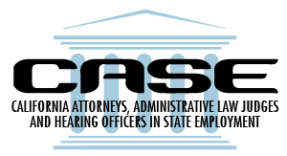Salary Equity. The CASE Bargaining Team met with CalHR on Wednesday to establish ground rules for this year’s MOU negotiations, emphasize the need for improved salary and benefits, pay parity for ALJs, and protected telework for all Unit 2 professionals, among other items.
Members of the CASE Bargaining Team provided valuable context to the Governor’s representatives from CalHR regarding the negative impacts of lagging salaries, a lack of paid family leave, and abrupt and arbitrary changes to two years of successful telework. They also highlighted the immense value CASE Members provide to the State of California: generating revenue through robust enforcement of the laws that protect California’s citizens, businesses, and resources.
CalHR’s representatives noted their eagerness to engage in productive conversations with the Bargaining Team.
ALJ Consolidation. CASE and CalHR discussed the two pay letters issued to state departments and agencies on March 16 marking the final stage of ALJ classification consolidation proposed by CalHR and approved by the State Personnel Board in January 2022. The class consolidation abolishes most “department specific” classifications, consolidating them into generic ALJ class series. CalHR acknowledged that for there will be salary impact on some of those affected but could not specify how many or the amounts. CalHR also noted that any salary changes required by the pay letters would need to be keyed in by departments and the State Controller’s Office, however regardless of when they are keyed, they will be retroactive to February 1, 2022. The Bargaining Team reminded CalHR that while the consolidation may serve a useful personnel purpose, it fails to erase the wide salary gap between ALJs and their equivalent attorney classifications. See the CalHR Pay Letters here.
Telework. The CASE Bargaining Team again described the directives issued by several state appointing authorities forcing attorneys and ALJs to return to office work up to three days per week, all with no operational need provided. The Team urged CalHR to seek intervention by Governor Newsom with an order that would provide maximum telework flexibility for the state’s legal professionals. CASE made clear to CalHR that it will press its many grievances to arbitration, if need be. CASE shared The Sacramento Bee “State Worker” article regarding telework which quotes CASE President Tim O’Connor, and CASE Director Ray Cervantez. Read the article here. (Note: The Sacramento Bee provides limited online access to non-subscribers.)
What’s Coming. Wednesday’s meeting set the scene for what’s to come: the in-depth discussion of every aspect of the Unit 2 Memorandum of Understanding and the presentation of proposals, supported by evidence and first-hand Member accounts, of the changes needed to empower CASE Members to best serve the State while providing for their families.
In the coming weeks and months, CASE will advocate for your interests at the bargaining table and via relationships with key elected officials and appointed agency and department leadership. Keep an eye out for Bargaining Team requests for experts to share their stories in bargaining as well as ways you can assist with building relationships with key officials to help us deliver our message loud and clear to Governor Newsom: CASE Members deserve better.
Next Meeting. Look for your CASE Team to press CalHR for needed improvements every week until a satisfactory MOU is reached. The teams meet next week, Tuesday and Thursday, and every week thereafter.

